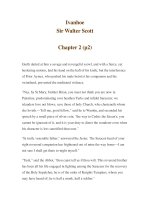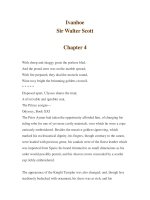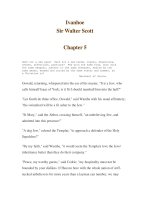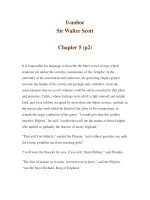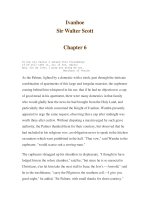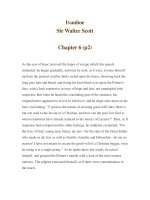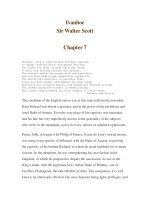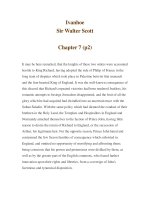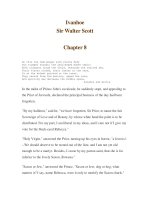Ivanhoe- Sir Walter Scott- Chapter 3 doc
Bạn đang xem bản rút gọn của tài liệu. Xem và tải ngay bản đầy đủ của tài liệu tại đây (32.53 KB, 11 trang )
Ivanhoe
Sir Walter Scott
Chapter 3
Then (sad relief!) from the bleak coast that hears
The German Ocean roar, deep-blooming, strong,
And yellow hair'd, the blue-eyed Saxon came.
Thomson's Liberty
In a hall, the height of which was greatly disproportioned to its extreme
length and width, a long oaken table, formed of planks rough-hewn from the
forest, and which had scarcely received anu polish, stood ready prepared for
the evening meal of Cedric the Saxon. The roof, composed of beams and
rafters, had nothing to divide the apartment from the sky excepting the
planking and thatch; there was a huge fireplace at either end of the hall, but
as the chimneys were constructed in a very clumsy manner, at least as much
of the smoke found its way into the apartment as escaped by the proper vent.
The constant vapour which this occasioned, had polished the rafters and
beams of the low-browed hall, by encrusting them with a black varnish of
soot. On the sides of the apartment hung implements of war and of the
chase, and there were at each corner folding doors, which gave access to
other parts of the extensive building.
The other appointments of the mansion partook of the rude simplicity of the
Saxon period, which Cedric piqued himself upon maintaining. The floor was
composed of earth mixed with lime, trodden into a hard substance, such as is
often employed in flooring our modern barns. For about one quarter of the
length of the apartment, the floor was raised by a step, and this space, which
was called the dais, was occupied only by the principal members of the
family, and visitors of distinction. For this purpose, a table richly covered
with scarlet cloth was placed transversely across the platform, from the
middle of which ran the longer and lower board, at which the domestics and
inferior persons fed, down towards the bottom of the hall. The whole
resembled the form of the letter T, or some of those ancient dinner-tables,
which, arranged on the same principles, may be still seen in the antique
Colleges of Oxford or Cambridge. Massive chairs and settles of carved oak
were placed upon the dais, and over these seats and the more elevated table
was fastened a canopy of cloth, which served in some degree to protect the
dignitaries who occupied that distinguished station from the weather, and
especially from the rain, which in some places found its way through the ill-
constructed roof.
The walls of this upper end of the hall, as far as the dais extended, were
covered with hangings or curtains, and upon the floor there was a carpet,
both of which were adorned with some attempts at tapestry, or embroidery,
executed with brilliant or rather gaudy colouring. Over the lower range of
table, the roof, as we have noticed, had no covering; the rough plastered
walls were left bare, and the rude earthen floor was uncarpeted; the board
was uncovered by a cloth, and rude massive benches supplied the place of
chairs.
In the centre of the upper table, were placed two chairs more elevated than
the rest, for the master and mistress of the family, who presided over the
scene of hospitality, and from doing so derived their Saxon title of honour,
which signifies "the Dividers of Bread."
To each of these chairs was added a footstool, curiously carved and inlaid
with ivory, which mark of distinction was peculiar to them. One of these
seats was at present occupied by Cedric the Saxon, who, though but in rank
a thane, or, as the Normans called him, a Franklin, felt, at the delay of his
evening meal, an irritable impatience, which might have become an
alderman, whether of ancient or of modern times.
It appeared, indeed, from the countenance of this proprietor, that he was of a
frank, but hasty and choleric temper. He was not above the middle stature,
but broad-shouldered, long-armed, and powerfully made, like one
accustomed to endure the fatigue of war or of the chase; his face was broad,
with large blue eyes, open and frank features, fine teeth, and a well formed
head, altogether expressive of that sort of good-humour which often lodges
with a sudden and hasty temper. Pride and jealousy there was in his eye, for
his life had been spent in asserting rights which were constantly liable to
invasion; and the prompt, fiery, and resolute disposition of the man, had
been kept constantly upon the alert by the circumstances of his situation. His
long yellow hair was equally divided on the top of his head and upon his
brow, and combed down on each side to the length of his shoulders; it had
but little tendency to grey, although Cedric was approaching to his sixtieth
year.
His dress was a tunic of forest green, furred at the throat and cuffs with what
was called minever; a kind of fur inferior in quality to ermine, and formed, it
is believed, of the skin of the grey squirrel. This doublet hung unbuttoned
over a close dress of scarlet which sate tight to his body; he had breeches of
the same, but they did not reach below the lower part of the thigh, leaving
the knee exposed. His feet had sandals of the same fashion with the peasants,
but of finer materials, and secured in the front with golden clasps. He had
bracelets of gold upon his arms, and a broad collar of the same precious
metal around his neck. About his waist he wore a richly-studded belt, in
which was stuck a short straight two-edged sword, with a sharp point, so
disposed as to hang almost perpendicularly by his side. Behind his seat was
hung a scarlet cloth cloak lined with fur, and a cap of the same materials
richly embroidered, which completed the dress of the opulent landholder
when he chose to go forth. A short boar-spear, with a broad and bright steel
head, also reclined against the back of his chair, which served him, when he
walked abroad, for the purposes of a staff or of a weapon, as chance might
require.
Several domestics, whose dress held various proportions betwixt the
richness of their master's, and the coarse and simple attire of Gurth the
swine-herd, watched the looks and waited the commands of the Saxon
dignitary. Two or three servants of a superior order stood behind their master
upon the dais; the rest occupied the lower part of the hall. Other attendants
there were of a different description; two or three large and shaggy
greyhounds, such as were then employed in hunting the stag and wolf; as
many slow-hounds of a large bony breed, with thick necks, large heads, and
long ears; and one or two of the smaller dogs, now called terriers, which
waited with impatience the arrival of the supper; but, with the sagacious
knowledge of physiognomy peculiar to their race, forbore to intrude upon
the moody silence of their master, apprehensive probably of a small white
truncheon which lay by Cedric's trencher, for the purpose of repelling the
advances of his four-legged dependants. One grisly old wolf-dog alone, with
the liberty of an indulged favourite, had planted himself close by the chair of
state, and occasionally ventured to solicit notice by putting his large hairy
head upon his master's knee, or pushing his nose into his hand. Even he was
repelled by the stern command, "Down, Balder, down! I am not in the
humour for foolery."
In fact, Cedric, as we have observed, was in no very placid state of mind.
The Lady Rowena, who had been absent to attend an evening mass at a
distant church, had but just returned, and was changing her garments, which
had been wetted by the storm. There were as yet no tidings of Gurth and his
charge, which should long since have been driven home from the forest and
such was the insecurity of the period, as to render it probable that the delay
might be explained by some depreciation of the outlaws, with whom the
adjacent forest abounded, or by the violence of some neighbouring baron,
whose consciousness of strength made him equally negligent of the laws of
property. The matter was of consequence, for great part of the domestic
wealth of the Saxon proprietors consisted in numerous herds of swine,
especially in forest-land, where those animals easily found their food.
Besides these subjects of anxiety, the Saxon thane was impatient for the
presence of his favourite clown Wamba, whose jests, such as they were,
served for a sort of seasoning to his evening meal, and to the deep draughts
of ale and wine with which he was in the habit of accompanying it. Add to
all this, Cedric had fasted since noon, and his usual supper hour was long
past, a cause of irritation common to country squires, both in ancient and
modern times. His displeasure was expressed in broken sentences, partly
muttered to himself, partly addressed to the domestics who stood around;
and particularly to his cupbearer, who offered him from time to time, as a
sedative, a silver goblet filled with wine "Why tarries the Lady Rowena?"
"She is but changing her head-gear," replied a female attendant, with as
much confidence as the favourite lady's-maid usually answers the master of
a modern family; "you would not wish her to sit down to the banquet in her
hood and kirtle? and no lady within the shire can be quicker in arraying
herself than my mistress."
This undeniable argument produced a sort of acquiescent umph! on the part
of the Saxon, with the addition, "I wish her devotion may choose fair
weather for the next visit to St John's Kirk; but what, in the name of ten
devils," continued he, turning to the cupbearer, and raising his voice as if
happy to have found a channel into which he might divert his indignation
without fear or control "what, in the name of ten devils, keeps Gurth so
long afield? I suppose we shall have an evil account of the herd; he was
wont to be a faithful and cautious drudge, and I had destined him for
something better; perchance I might even have made him one of my
warders."*
* The original has "Cnichts", by which the Saxons seem to
* have designated a class of military attendants, sometimes
* free, sometimes bondsmen, but always ranking above an
* ordinary domestic, whether in the royal household or in
* those of the aldermen and thanes. But the term cnicht,
* now spelt knight, having been received into the English
* language as equivalent to the Norman word chevalier, I
* have avoided using it in its more ancient sense, to
* prevent confusion. L. T.
Oswald the cupbearer modestly suggested, "that it was scarce an hour since
the tolling of the curfew;" an ill-chosen apology, since it turned upon a topic
so harsh to Saxon ears.
"The foul fiend," exclaimed Cedric, "take the curfew-bell, and the tyrannical
bastard by whom it was devised, and the heartless slave who names it with a
Saxon tongue to a Saxon ear! The curfew!" he added, pausing, "ay, the
curfew; which compels true men to extinguish their lights, that thieves and
robbers may work their deeds in darkness! Ay, the curfew; Reginald
Front-de-Boeuf and Philip de Malvoisin know the use of the curfew as well
as William the Bastard himself, or e'er a Norman adventurer that fought at
Hastings. I shall hear, I guess, that my property has been swept off to save
from starving the hungry banditti, whom they cannot support but by theft
and robbery. My faithful slave is murdered, and my goods are taken for a
prey and Wamba where is Wamba? Said not some one he had gone forth
with Gurth?"
Oswald replied in the affirmative.
"Ay? why this is better and better! he is carried off too, the Saxon fool, to
serve the Norman lord. Fools are we all indeed that serve them, and fitter
subjects for their scorn and laughter, than if we were born with but half our
wits. But I will be avenged," he added, starting from his chair in impatience
at the supposed injury, and catching hold of his boar-spear; "I will go with
my complaint to the great council; I have friends, I have followers man to
man will I appeal the Norman to the lists; let him come in his plate and his
mail, and all that can render cowardice bold; I have sent such a javelin as
this through a stronger fence than three of their war shields! Haply they
think me old; but they shall find, alone and childless as I am, the blood of
Hereward is in the veins of Cedric Ah, Wilfred, Wilfred!" he exclaimed in
a lower tone, "couldst thou have ruled thine unreasonable passion, thy father
had not been left in his age like the solitary oak that throws out its shattered
and unprotected branches against the full sweep of the tempest!" The
reflection seemed to conjure into sadness his irritated feelings. Replacing his
javelin, he resumed his seat, bent his looks downward, and appeared to be
absorbed in melancholy reflection.
>From his musing, Cedric was suddenly awakened by the blast of a horn,
which was replied to by the clamorous yells and barking of all the dogs in
the hall, and some twenty or thirty which were quartered in other parts of the
building. It cost some exercise of the white truncheon, well seconded by the
exertions of the domestics, to silence this canine clamour.
"To the gate, knaves!" said the Saxon, hastily, as soon as the tumult was so
much appeased that the dependants could hear his voice. "See what tidings
that horn tells us of to announce, I ween, some hership*
* Pillage.
and robbery which has been done upon my lands."
Returning in less than three minutes, a warder announced "that the Prior
Aymer of Jorvaulx, and the good knight Brian de Bois-Guilbert, commander
of the valiant and venerable order of Knights Templars, with a small retinue,
requested hospitality and lodging for the night, being on their way to a
tournament which was to be held not far from Ashby-de-la-Zouche, on the
second day from the present."
"Aymer, the Prior Aymer? Brian de Bois-Guilbert?" muttered Cedric;
"Normans both; but Norman or Saxon, the hospitality of Rotherwood must
not be impeached; they are welcome, since they have chosen to halt more
welcome would they have been to have ridden further on their way But it
were unworthy to murmur for a night's lodging and a night's food; in the
quality of guests, at least, even Normans must suppress their insolence
Go, Hundebert," he added, to a sort of major-domo who stood behind him
with a white wand; "take six of the attendants, and introduce the strangers to
the guests' lodging. Look after their horses and mules, and see their train
lack nothing. Let them have change of vestments if they require it, and fire,
and water to wash, and wine and ale; and bid the cooks add what they hastily
can to our evening meal; and let it be put on the board when those strangers
are ready to share it. Say to them, Hundebert, that Cedric would himself bid
them welcome, but he is under a vow never to step more than three steps
from the dais of his own hall to meet any who shares not the blood of Saxon
royalty. Begone! see them carefully tended; let them not say in their pride,
the Saxon churl has shown at once his poverty and his avarice."
The major-domo departed with several attendants, to execute his master's
commands.
"The Prior Aymer!" repeated Cedric, looking to Oswald, "the brother, if I
mistake not, of Giles de Mauleverer, now lord of Middleham?"
Oswald made a respectful sign of assent. "His brother sits in the seat, and
usurps the patrimony, of a better race, the race of Ulfgar of Middleham; but
what Norman lord doth not the same? This Prior is, they say, a free and
jovial priest, who loves the wine-cup and the bugle-horn better than bell and
book: Good; let him come, he shall be welcome. How named ye the
Templar?"
"Brian de Bois-Guilbert."
"Bois-Guilbert," said Cedric, still in the musing, half-arguing tone, which
the habit of living among dependants had accustomed him to employ, and
which resembled a man who talks to himself rather than to those around
him "Bois-Guilbert? that name has been spread wide both for good and
evil. They say he is valiant as the bravest of his order; but stained with their
usual vices, pride, arrogance, cruelty, and voluptuousness; a hard-hearted
man, who knows neither fear of earth, nor awe of heaven. So say the few
warriors who have returned from Palestine Well; it is but for one night; he
shall be welcome too Oswald, broach the oldest wine-cask; place the best
mead, the mightiest ale, the richest morat, the most sparkling cider, the most
odoriferous pigments, upon the board; fill the largest horns*
* These were drinks used by the Saxons, as we are informed
* by Mr Turner: Morat was made of honey flavoured with the
* juice of mulberries; Pigment was a sweet and rich liquor,
* composed of wine highly spiced, and sweetened also with
* honey; the other liquors need no explanation. L. T.
Templars and Abbots love good wines and good measure. Elgitha, let
thy Lady Rowena, know we shall not this night expect her in the hall, unless
such be her especial pleasure."
"But it will be her especial pleasure," answered Elgitha, with great readiness,
"for she is ever desirous to hear the latest news from Palestine."
Cedric darted at the forward damsel a glance of hasty resentment; but
Rowena, and whatever belonged to her, were privileged and secure from his
anger. He only replied, "Silence, maiden; thy tongue outruns thy discretion.
Say my message to thy mistress, and let her do her pleasure. Here, at least,
the descendant of Alfred still reigns a princess." Elgitha left the apartment.
"Palestine!" repeated the Saxon; "Palestine! how many ears are turned to the
tales which dissolute crusaders, or hypocritical pilgrims, bring from that
fatal land! I too might ask I too might enquire I too might listen with a
beating heart to fables which the wily strollers devise to cheat us into
hospitality but no The son who has disobeyed me is no longer mine; nor
will I concern myself more for his fate than for that of the most worthless
among the millions that ever shaped the cross on their shoulder, rushed into
excess and blood-guiltiness, and called it an accomplishment of the will of
God."
He knit his brows, and fixed his eyes for an instant on the ground; as he
raised them, the folding doors at the bottom of the hall were cast wide, and,
preceded by the major-domo with his wand, and four domestics bearing
blazing torches, the guests of the evening entered the apartment.

